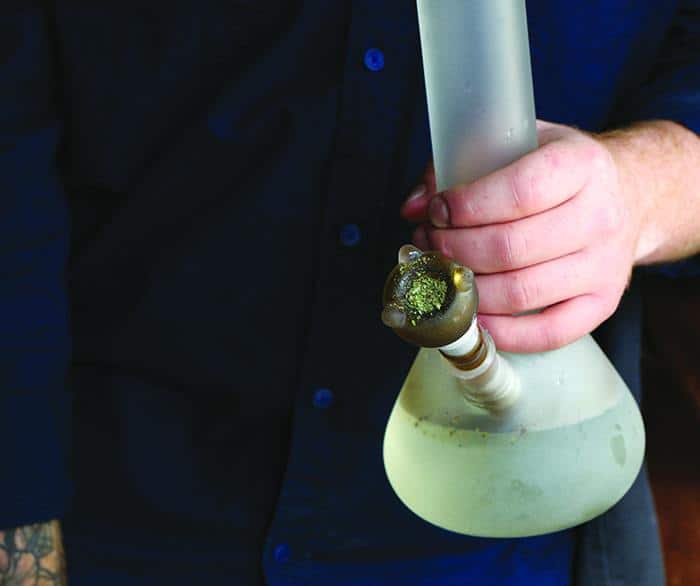Hipsters, beware! Weed is here!

author: mason sliva | a & c editor

Credit: Jaecy Bells
Whether you want to smoke weed or not is irrelevant; it is the basic economic reality that legalization will benefit Canadian society.
Hipsters beware: marijuana has hit the mainstream. The substance that was once used by “criminals and degenerates (aka artists)” has turned into your grandmother Ethel secretly ripping fat clouds to “help with her arthritis.” However, not everybody is on board with this change, and the non-believers have brought up a lot of valid concerns. Well, when that one weird auntie that you only see once a year starts complaining about those crazy liberals and their devil’s lettuce, you can reference back to this article, and dispel her concerns.
Throughout this article, you’ll see a frequent reference back to Colorado, as it became the first state to legalize marijuana back in 2012. For statistics purposes, Canada is roughly 6.5 times the size of Colorado, and this multiplier will be used to analyze tax revenues. Colorado has a similar setup to the proposed model in Canada and collects merely revenues from taxes on private business.
In 2014, only two years after legalizing recreational marijuana, Colorado earned tax revenues of USD$76 million, with this increasing to USD$135 million in 2015. Therefore, with weed being legalized in Canada in 2018, this would hint toward tax revenues of USD $498 million in 2020, and USD$884 million in 2021. Also, remembering the exchange rate, this would mean revenues of CAD$615 million in 2020, and CAD$1.1 billion in 2021. Those are some serious numbers.
Now, in Saskatchewanian terms, this would mean you could fund Brad Wall’s “fuck you, I’m out” project, the Regina bypass, in about two years. However, in a practical world, cannabis legalization could provide funds to help improve the life of all Canadians. It costs roughly $2-3 million to support an elementary school every year, and this means that cannabis legalization could support 350-550 additional elementary schools every year. Obviously, this doesn’t factor in the cost of building the schools, but it is a simplification that shows the significant effect that these funds could support our country and its infrastructure.
Maybe your strange aunt hasn’t been swayed by the tax benefits of legalizing pot, and is now instead concerned that all the children will now be smoking reefer. Going back on a trip to our friend Colorado, we have seen that cannabis use hasn’t increased among teens, with usage going from 22 per cent in 2010, to 21.2 percent in 2015. Even better, Washington State has reported that after polling students in the sixth, eighth, tenth, and twelve grades, usage went from 20 per cent in 2010 to 17 per cent in 2015. This means that not only has usage not become more common around teens, but also it has actually decreased, likely due to the increased barriers to purchasing a regulated substance underage.
However, cannabis legalization is not all roses and sunshine, and there are significant concerns that have been confirmed in the states that have already legalized. There are very real worries of increased impaired driving, with Colorado seeing 14 per cent more traffic incidents in 2014 as compared to the prior year. While a certain rise is to be expected year after year, 2.7 per cent of that increase was attributed to the legalization of cannabis. This highlights the importance of ensuring strict consequences for those who get behind the wheel impaired.
Overall, a substance itself is neither inherently good nor bad. Instead, it is simply how people choose to use the substance, and how it is implemented in society, that decides whether it will be viewed positively or negatively. However, the reality is that people have, do, and will smoke weed, and it is a time that the government caught up to society. Whether you want to smoke weed or not is irrelevant; it is the basic economic reality that legalization will benefit Canadian society.
In an ideal world, marijuana legalization is not the final destination. Obviously, it will be a great victory for those who support personal freedom, but there is still much work to do. The fact of the matter is that cannabis is just the tip of an iceberg that has been swept under the rug. Hopefully, some attention will be brought to the world of other illegal substances, and a push for drug decriminalization will be legitimized. Progress does not need to stop because one goal has been achieved, and drug decriminalization will be the harbinger for a society that views addiction as a health problem instead of a criminal problem. No longer can society hide the ugly reality that persists under the glamorization of the Western world.









